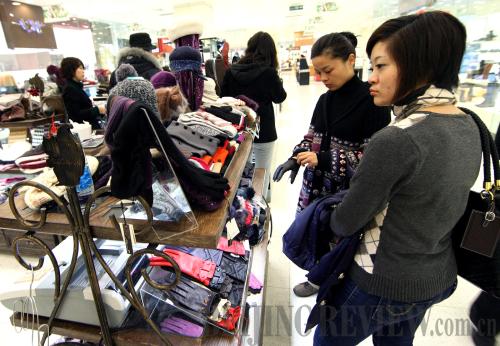|
|

|
|
CONSUMPTION BOOST: Consumers shop in a Shanghai mall. The Chinese economy is being held up partly by steady growth in the consumer market CHEN FEI |
Attempting to let air out of the bubbles, policymakers scaled back tax exemptions on property sales and also raised the down payment requirement for purchasing second or all subsequent houses.
On the monetary front, the central bank has drained net cash from the banking system through open market operations for 14 consecutive weeks as of mid-January. In its latest move, the central bank raised the yield it pays on one-year bills in an effort to siphon liquidity out of the financial system by making debt securities more attractive for banks to buy.
The government additionally called for more rational and balanced lending, raising the red flag concerning overheating loans. However, the overall surge in lending has shown few signs of wearing off as local banks rushed out new loans in anticipation of serious monetary tightening policies. New loans in the first week of 2010 totaled 600 billion yuan ($88 billion), nearly double the monthly average in the second half of last year.
Despite its minimal impact on the real economy, the increase in the reserve requirement ratio has sent out a strong signal that the government will not leave the economy to find equilibrium on its own, said Ha Jiming, chief economist with the Beijing-based China International Capital Corp.
"It seems that the authorities will respond to market changes with greater flexibility," he said.
Stimulus future
Economists are divided concerning the future of China's stimulus measures. Most believe the country will not deviate or make decreases to the plan until a solid recovery is firmly in place, although the increase in the reserve requirement ratio has led many to move up their estimates as to when the first interest rate hike will occur.
The recent boost in required reserves is a clear indicator the central bank is obviously smoothing the way for an earlier launch of real austerity policies, said Andy Xie, an independent Shanghai-based economist and former Morgan Stanley chief economist for Asia. The next interest rate increase can be expected to come as early as the first quarter of 2010, he added.
But a Merrill Lynch report suggested a different view. "The People's Bank of China nudged the reserve requirement ratio to mop up liquidity because it has no intention to push up interest rates much further," the report stated.
Interest rates will most likely increase only once this year in the first quarter, with the reserve requirement ratio reaching 18 percent for larger banks and 16 percent for smaller ones by year's end, the report added.
The timetable for withdrawals of or changes to current stimulus policies is difficult to predict and, to some extent, is dependent on the health of the global economy, said He Fan, a researcher at the Chinese Academy of Social Sciences. But one thing is certain—an early interest rate hike ahead of Western countries would accelerate hot money inflows and create waves in domestic financial waters, he said.
Since late last year, hot money has made its way into the country as international speculators make large bets on China where the buoyant economy provides a higher level of earnings visibility. An expected appreciation of the renminbi also offered a risk-free source of profit.
Policymakers this year will have to walk a fine line between inflation and the downturn, added He. While properly addressing excessive liquidity, they will also need to stimulate the job market and household consumption, said He. | 